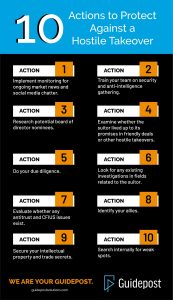This site uses cookies to provide you with a more responsive and personalized service. By using this site you agree to our use of cookies. You can learn more about our use of cookies and similar technologies and your choices by reviewing our Privacy Policy. By clicking “I agree” you agree to our use of cookies and similar technologies.
Hostile Takeovers – It’s Time to Dust Off the Defensive Playbook
Hall of Fame Pitcher Satchel Paige once said, “Don’t look back. Something might be gaining on you.” This great advice could use a revision: look back, for what’s behind you may be catching up.
Hostile takeovers are back in the news. Recently, CoreLogic, the real estate industry data and analytics giant, had to beat back a takeover bid from Cannae Holdings and Senator Investment Group, eventually approving a merger agreement with two private equity firms, Stone Point Capital and Insight Partners.
While it’s been some time, the 1980s were the heyday of the hostile takeover. That’s when several of us at Guidepost Solutions honed our legal and consulting skills, and we haven’t forgotten the lessons learned from this era of deregulation and corporate raiders. Now, with hostile takeovers seemingly primed to reemerge on the scene, it’s important that today’s businesses apply the lessons learned decades ago, even with new realities in corporate finance, security, technology, and fast-paced news cycles.
Preparing for such battles, whether or not you know the fight has begun, applies not just to hostile takeovers but also to being subject to shareholder activist campaigns. The key is to identify when your business is a target and develop the most robust defense. Either way, one day, someone could come after your company, and it’s in the best interest of your shareholders to be prepared.
There are areas to be particularly mindful of when your business is engaged in a hostile takeover fight. Simple steps include ensuring communications are secure and defending against third-party intelligence gathering. In fact, these are important whether a takeover war is in play or not. Other steps could be dependent on the structure of the offer from the unwanted acquirer, be it all cash or including stock as an element.
That said, here are ten crucial actions to take to protect your company if it becomes the target of a hostile takeover, many of which also apply to activist campaigns:
- Implement monitoring for ongoing market news and social media chatter using both AI-driven technology and human intelligence. This can help ensure that you’re not caught flatfooted. Today, social media can be a very valuable source of intelligence.
- Train your team on security and anti-intelligence gathering. Suitors will use whatever means they can to find intel on your company to gain the upper hand. The element of surprise is to their advantage. Each person inside your organization should know the tips and tricks used by those looking for ways to learn how to best form a plan of attack. Often the inquiry is directed at lower-level employees.
- Research potential board of director nominees. What are they doing now? What is in their past and what are their former company affiliations? Have they had issues at past companies? Those looking to take over your organization can lay the groundwork in advance of their approach through existing relationships they may already have with your board members.
- Examine whether the suitor lived up to its promises in friendly deals or other hostile takeovers. What’s the history of the suitor? Do they have a history of making wholesale cost cuts to expand earnings vs making value-added key investments? Suitors will claim they aren’t looking to micromanage the business, but rather add “strategic value” to grow shareholder value. They’ll likely try to paint a more encouraging picture of their track record than what the reality may be.
- Do your due diligence. Take a deep dive, beyond what your bankers may consider, to determine if the suitor’s stock is worth what the market states or are there lurking problems. Whether related to FCPA, ESG, or supply chain liabilities, unknown concerns could damage the value of the stock being offered in a takeover. This isn’t an issue in an all-cash deal; but if the takeover is a combination of cash and stock, there can be dangers around the corner.
- Look for any existing investigations in fields related to the suitor which could ensnare the suitor in civil or regulatory action now or down the road. For example, if a major car manufacturer has a problem with its new driverless technology, you can be sure its competitors will want to know. If there’s an industry-wide problem, the takeover bidder going after a company may have the same issue, which could impact the long-term value of its stock if these issues were to come to light.
- Evaluate whether any antitrust and CFIUS issues exist which can work in your favor. With an antitrust issue, the government could determine that the bidder is engaging in anti-competitive behavior. With CFIUS, for instance, if a Chinese company is trying to take over a U.S. company, there is a real risk that the U.S. company will lose its government contracts. No one wants a complicated takeover that might require the eventual divestiture of a particular business unit involved in the deal. These potential minefields can serve as a warning to the bidder, that the deal is not worth the headache. Often it takes experienced digging to identify the CFIUS issues.
- Identify your allies. Who will be on your side when your leadership is under attack, whether internally (members of your board) or third parties (customers)? It may even be who you least expect.
- Secure your intellectual property and trade secrets. Your suitor will look for every advantage it can find. Are there ways they can leverage your proprietary information against you. To that end, providing special training to the appropriate employees on how to identify approaches from adversaries can help prevent this from becoming an issue.
- Search internally for weak spots. Perform the equivalent of a self-due diligence examination to determine where vulnerabilities may lie and anticipate efforts from your suitor to take advantage of them. Once you’ve identified them, take steps to remedy any issues, you will be in a stronger position to fend off the takeover attempt and your company will benefit from the results.
Amid the COVID-19 pandemic, many companies are under more strain than ever before – making them susceptible to an enticing takeover bid by a potential acquirer, or even a strategic campaign by activist investors looking to shake things up or get a quick win on stock price. Whether or not your company is at risk now or may be in the future, taking steps to secure your business and protect shareholder value, can be the difference between remaining in control or becoming a victim. What’s old is new again and as hostile takeovers retake center stage, you can be sure that bidders are scouring the market for the right opportunity. Don’t let your company be that opportunity.

Bart M Schwartz
Co-Founder and Chairman
Described by The New York Times as the person “often sought out in…thorny situations,” Bart M. Schwartz is a founder and the chairman of Guidepost Solutions, where he provides compliance, ethics, and integrity monitoring and investigative services. He is a former Chief of the Criminal Division of the United States Attorney’s Office for the Southern District of New York. For more than 30 years, Mr. Schwartz has managed sensitive and complex matters for a wide array of clients including government agencies, international corporations, and not-for-profits.



